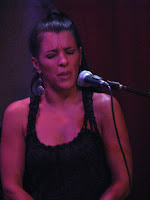 |
| La Chicuela |
Flamenco friends and colleagues, I am stuck.
Costumbrist literature in Spain as early as the 1840s describes a typical festival, the sweet wine, sweet oranges, beautiful sunset, sweet women... But always in Costumbrist literature describing the South of Spain there is a very unique role, afforded to those who are somewhat displaced.
Here is an example of costumbrist;
Washington Irving, Cuentos de la Alhambra, "The Journey"
The role of the foreigner, as expounded in 1841, hasn´t changed much. "We ordered our host to let wine and refreshment circulate..." We are in fact, the patrons.
The patron or señorito was the rich, landed gentleman, often characterized with the debonaire mustache, slight yet contagious smile, and pressed slacks who circulated money and favors among the artists. The artists are always the working class; the bar maid, the basket-maker who sings while he weaves, the single daughter of a muleteer who is known for her spirited tongue and her beautiful dancing. But the patron is always a foreigner. An exile from the city life, a semi-prosperous noble with a taste for country pursuits. A foreign transplant fleeing from the bleak ticky-tack of New York, London or Boston.
What do we do with the modern exiles? The cultural exiles?
The 60s saw American women, made passionate by flamenco singers and dancers, throwing themselves at the first bed they found. Such is the case of Ramón Sender's La tesis de Nancy, or the autobiographical novel Returning to A, by Dorien Ross. The men, it seems, found in their plaintive guitar strings, a newly re-discovered masculinity--a world of blood feuds, of chauvinism, and of passion. Hence, The Wind Cried: An American´s Discovery of Flamenco, or the better known The Flamenco Academy, by Sarah Bird.
 |
| Cristina Benítez |
The latter novel was published in 2006. But the story is the same. Where does an black-red-polkadot-California-ABD-smoker-and-currently-really-trying-to-be-a-non-drinker have to do with flamenco in Barcelona?
I am rematando today with a letra. Instead of the lover seeking out his beloved, this is the AUGH! of a Californiana al mundo flamenco.
Cuando paso por tu casa
Compro pan y voy comiendo;
Pa que tu gente no diga
Que con verte me mantengo.
No comments:
Post a Comment